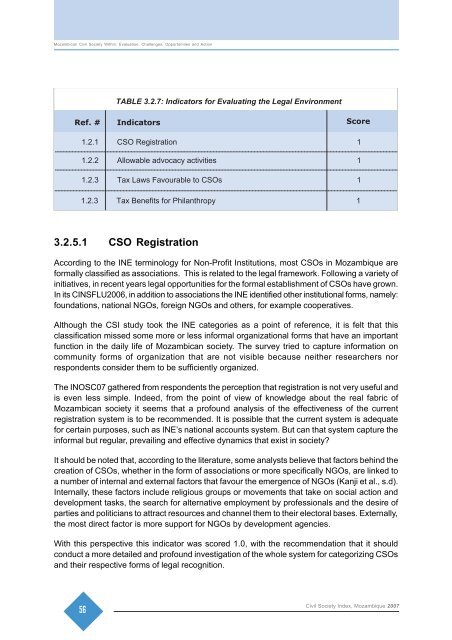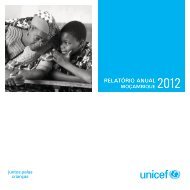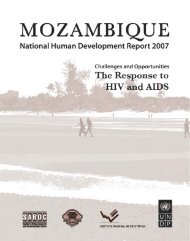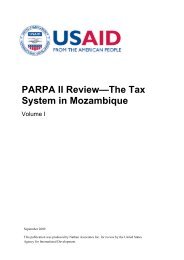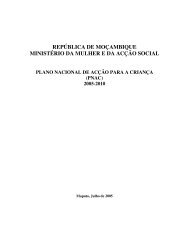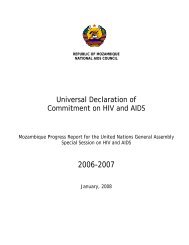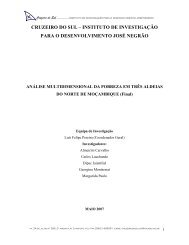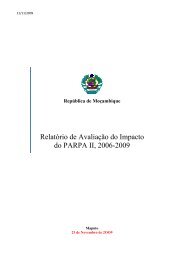Mozambican Civil Society Within: - UNICEF Mozambique - Home page
Mozambican Civil Society Within: - UNICEF Mozambique - Home page
Mozambican Civil Society Within: - UNICEF Mozambique - Home page
Create successful ePaper yourself
Turn your PDF publications into a flip-book with our unique Google optimized e-Paper software.
<strong>Mozambican</strong> <strong>Civil</strong> <strong>Society</strong> <strong>Within</strong>: Evaluation, Challenges, Opportunities and Action<br />
TABLE 3.2.7: Indicators for Evaluating the Legal Environment<br />
Ref. # Indicators Score<br />
1.2.1 CSO Registration 1<br />
1.2.2 Allowable advocacy activities 1<br />
1.2.3 Tax Laws Favourable to CSOs 1<br />
1.2.3 Tax Benefits for Philanthropy 1<br />
3.2.5.1 CSO Registration<br />
According to the INE terminology for Non-Profit Institutions, most CSOs in <strong>Mozambique</strong> are<br />
formally classified as associations. This is related to the legal framework. Following a variety of<br />
initiatives, in recent years legal opportunities for the formal establishment of CSOs have grown.<br />
In its CINSFLU2006, in addition to associations the INE identified other institutional forms, namely:<br />
foundations, national NGOs, foreign NGOs and others, for example cooperatives.<br />
Although the CSI study took the INE categories as a point of reference, it is felt that this<br />
classification missed some more or less informal organizational forms that have an important<br />
function in the daily life of <strong>Mozambican</strong> society. The survey tried to capture information on<br />
community forms of organization that are not visible because neither researchers nor<br />
respondents consider them to be sufficiently organized.<br />
The INOSC07 gathered from respondents the perception that registration is not very useful and<br />
is even less simple. Indeed, from the point of view of knowledge about the real fabric of<br />
<strong>Mozambican</strong> society it seems that a profound analysis of the effectiveness of the current<br />
registration system is to be recommended. It is possible that the current system is adequate<br />
for certain purposes, such as INE’s national accounts system. But can that system capture the<br />
informal but regular, prevailing and effective dynamics that exist in society?<br />
It should be noted that, according to the literature, some analysts believe that factors behind the<br />
creation of CSOs, whether in the form of associations or more specifically NGOs, are linked to<br />
a number of internal and external factors that favour the emergence of NGOs (Kanji et al., s.d).<br />
Internally, these factors include religious groups or movements that take on social action and<br />
development tasks, the search for alternative employment by professionals and the desire of<br />
parties and politicians to attract resources and channel them to their electoral bases. Externally,<br />
the most direct factor is more support for NGOs by development agencies.<br />
With this perspective this indicator was scored 1.0, with the recommendation that it should<br />
conduct a more detailed and profound investigation of the whole system for categorizing CSOs<br />
and their respective forms of legal recognition.<br />
56<br />
<strong>Civil</strong> <strong>Society</strong> Index, <strong>Mozambique</strong> 2007


